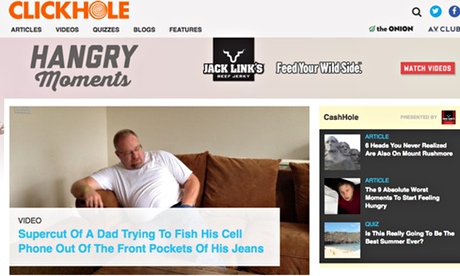
On 12 June this year the Onion launched ClickHole, a fully functioning satire of “clickbait” journalism and the viral-hungry websites that have dominated the early years of the social media age.
With the tagline “because all content deserves to go viral”, the site’s initial targets were obvious. Upworthy’s disingenuous, cloying headlines and the Huffington Post’s page view-generating slideshows and – most of all – the triviality (and endless quizzes) of Buzzfeed, were all ruthlessly lampooned in the first week, causing those sites’ many critics to rejoice.
But two months in, that particular joke is already starting to look stale. Part of the problem with making fun of Buzzfeed is that the site is already extremely self-aware as it is. Whenever anyone has written a high-profile article being sniffy about them, with the inevitable attempt to dream up a ridiculous headline the site might run, they’ve usually gone ahead and made the article anyway – the perfect riposte. It’s hard to make fun of something already laughing at itself, or as Jason Zinoman put it in his piece on ClickHole in the New York Times, “self-important media is easier to mock than the tongue-in-cheek form”.
Instead, ClickHole is starting to expand its targets, and steadily improving as a result. This week’s ‘7 Robin Williams Gifs That Imperfectly Sum Up His Life And Career’ is, on the surface of it, a satire of the way news websites make traffic hay out of tragedies by way of cheap sentimentality.
But if that were the intention, the title would read “Perfectly Sum Up”, not “Imperfectly”. Instead, as you read the piece it becomes clear it is taking aim at social media users themselves, such as the thousands who mindlessly retweeted the now famous “Genie, you’re free” Gif from Aladdin, rather than offer an original response to an event they profess to being so moved by.
Not only that, but Clickhole is starting to tacitly admit they too have much to learn from BuzzFeed’s approach. Take, for example, a post from this week entitled “8 More Unarmed Teens Still At Large”. A reaction to the recent controversy surrounding the shooting of 18-year-old Michael Brown in Missouri, it is laid out like a BuzzFeed list with several images (all young men) each with a short caption (“Anthony Russell, 14, Last seen hovering near entrance to library. Extremely unarmed”).
Its target is clearly certain attitudes within the Missouri police department and racial profiling in general and it could well have appeared on The Onion, except The Onion doesn’t publish lists in this way. What the piece actually demonstrates is the usefulness of the BuzzFeed format to make a concise, impactful point. It highlights the site’s strength, not its weaknesses.
The problem with this shift is that Clickhole’s aims have started to look a little muddied – is it a satire of clickbait, or good satire done as clickbait? The Onion’s strength has always been its startling consistency, born out of old-fashioned, stringent editing. Even the shortest, most seemingly throwaway story on its pages has been whittled down from an initial brainstorm of hundreds, and every story is unmistakably an Onion piece of writing. Making satire look easy is an incredible exacting process, and at the moment, the tone of ClickHole is far too uneven to be held in the same regard.
But as a work in progress, the site is still managing to be funny and inventive often enough to look like it could become a long-term success. Increasingly, Clickhole’s target is not BuzzFeed but the wider internet culture it helped spawn and now thrives on. This should prove a far richer vein to tap than just making fun of clickbait, which has long been a cliché in itself.
I’ve written before about the problems that arise when long established titles try to catch up with BuzzFeed by simply copying what they do, compromising their editorial voice as a result. It’s a short-sighted, panicked approach to digital publishing happening across UK media ands we should despair of it. With ClickHole, the Onion appears to be doing the opposite: taking lessons from the new media giants (even as it makes fun of them), but doing so in a way that fits its own voice and plays to its own strengths. It’s too early to tell how long it will last, but for now it’s setting a fascinating example to us all.
Sam Parker is deputy editor of Esquire.co.uk.
• To contact the MediaGuardian news desk email media@theguardian.com or phone 020 3353 3857. For all other inquiries please call the main Guardian switchboard on 020 3353 2000. If you are writing a comment for publication, please mark clearly “for publication”.
• To get the latest media news to your desktop or mobile, follow MediaGuardian on Twitter and Facebook.

